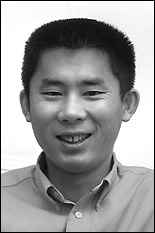Yu Joins Fischell Department Faculty
The Fischell Department of Bioengineering welcomes its newest faculty member, Associate Professor Bruce Yu. Yu will hold a joint appointment with the University of Maryland's School of Pharmacy.
Yu received his Ph.D. from Johns Hopkins University in 1996. Before joining our faculty he held a postdoctoral position at the University of Alberta, Canada and served as an assistant professor in the Department of Pharmaceutics and Pharmaceutical Chemistry at the University of Utah. He is the recipient of a Kimmel Scholar Award in cancer research (2004) and a Presidential Early Career Award for Scientists and Engineers (PECASE) for his biomaterials research (2005).
Yu's research falls into two categories: the engineering of mechanosensors to aid the repair and rehabilitation of injured musculoskeletal tissues, and the delivery of radiopharmaceuticals for cancer therapy. In both cases, he is developing materials and processes that would allow doctors to monitor patients in real time and without surgery.
Mechanosensors measure mechanical forces in the human body, providing doctors with information used to guide the treatment and repair of musculoskeletal tissue damage. Currently, they are made of metals, ceramics and plastics. Surgery is required both to implant and retrieve them. Yu's goal is to develop soft, force-sensitive materials that can be injected into a patient’s body. Their reactions to conditions at injury sites would be recorded in a force-response profile, measured non-invasively by magnetic resonance imaging (MRI). After measurements are taken, the mechanosensors would degrade automatically and harmlessly, so no surgery would be needed.
Currently, Yu is developing force-sensitive nanofiber networks (FSNN). FSNN are made of pliable biomaterials (peptides and their derivatives), so that they are both injectable and biodegradable. Magnetic probes that can be detected by MRI are embedded in the FSNN. It was Yu's work in this area that earned him NIH funding and the PECASE award.
For the delivery of radiopharmaceuticals—drugs that carry radionuclides as part of radiation therapy for cancer—Yu is developing fluorocarbon nanoparticles as multifunctional delivery vehicles. His approach is to integrate MRI with targeted therapy, allowing doctors to guide monitor radiopharmaceuticals in real time, then create individualized treatment plans for cancer patients based on their responses to the medication. This project has received funding from the NIH and the PHRMA Foundation, and earned him the Kimmel Scholar Award.
Chemistry is the foundation of Yu’s research. A significant portion his work is devoted to the design and synthesis of new molecules, which form the basis of his new materials and devices. He also plans to begin surface coating research.
May 9, 2007 Prev Next |


